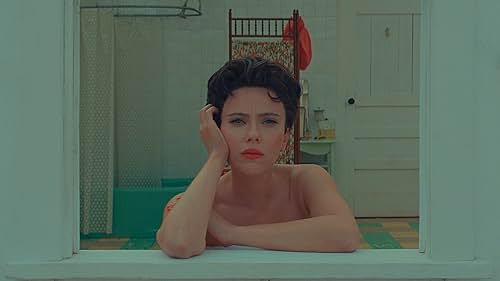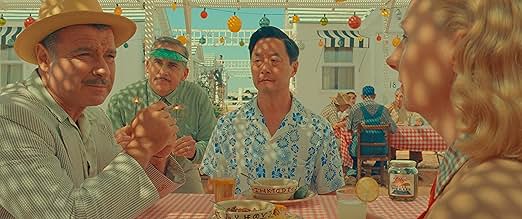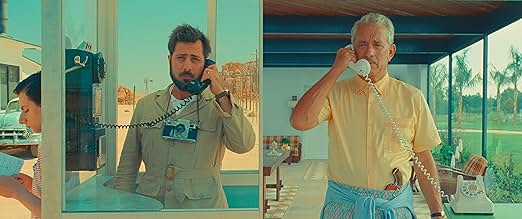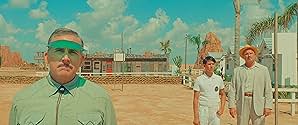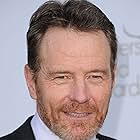World-changing events spectacularly disrupt the annual Asteroid Day celebration in an American desert town.World-changing events spectacularly disrupt the annual Asteroid Day celebration in an American desert town.World-changing events spectacularly disrupt the annual Asteroid Day celebration in an American desert town.
- Awards
- 5 wins & 90 nominations total
Steve Park
- Roger Cho
- (as Stephen Park)
Featured reviews
I saw 'ASTEROID CITY' yesterday...and I have a
mixed feelings about it....
As usual, stylistically very impressive, with strong emphasis on ensemble work of actors, as it's usually happens in Wes Anderson's movies.
When movie is considered ensemble piece the pressure of a film success falls on the shoulders of the director. In a normal narrative film the protagonist and antagonist often take the burden of film success on themselves, hoping that the audience will emphasize with our lead characters and their character arc, to be immersed in the story during the full running time.
There is a risk however if the audience doesn't connect with performances the status of leading man or a woman is in jeopardy, with producers in the future not wanting to green light another film with actors, which were unable to handle the "weight" of the movie.
This is why plenty of actors like to work on movies which offer ensemble feel. They don't have to spend many months on filmset, instead they come for few days, shoot their scenes and can move on to the next project. If their performance didn't work they are always supported by other quality actors, so it doesn't ruin the whole film. In ether way Wes Anderson's style always comes on top, as actors who work with him understand the particular speed of lines delivery, as well as dryness of the dialog.
Stylistically it's very much what we expect from Anderson. Cinematography is more interesting then usual with a strong emphasis on production and costumes design. The camera movement feel bit more free then usual and yet the composition is always full of symmetry, which is the calling card of Wes. He even included few inserts (close ups of objects, which normally make thinks appear more cinematic) which for his filmmaking style is rather unusual. As well as few "Dutch angles", which make the audience feel sense of distorted reality in moments of surrealism.
The color correction ranging from black and white to colorful over saturation is rather visually interesting.
There is a lot of quality here, but I am afraid 'ASTEROID CITY' might not be everyone's taste, although fans of Anderson know what to expect and should have a good time.
More casual viewers might feel like this film is a little stylistically disjointed.
For me I appreciate what Wes was trying to accomplish and always admire his stylistic consistency, which has its benefits (you know what to expect), but also it's throwbacks, when Wes just like in this case is trying to explore a new filmmaking narrative techniques.
Recommend! 👍
When movie is considered ensemble piece the pressure of a film success falls on the shoulders of the director. In a normal narrative film the protagonist and antagonist often take the burden of film success on themselves, hoping that the audience will emphasize with our lead characters and their character arc, to be immersed in the story during the full running time.
There is a risk however if the audience doesn't connect with performances the status of leading man or a woman is in jeopardy, with producers in the future not wanting to green light another film with actors, which were unable to handle the "weight" of the movie.
This is why plenty of actors like to work on movies which offer ensemble feel. They don't have to spend many months on filmset, instead they come for few days, shoot their scenes and can move on to the next project. If their performance didn't work they are always supported by other quality actors, so it doesn't ruin the whole film. In ether way Wes Anderson's style always comes on top, as actors who work with him understand the particular speed of lines delivery, as well as dryness of the dialog.
Stylistically it's very much what we expect from Anderson. Cinematography is more interesting then usual with a strong emphasis on production and costumes design. The camera movement feel bit more free then usual and yet the composition is always full of symmetry, which is the calling card of Wes. He even included few inserts (close ups of objects, which normally make thinks appear more cinematic) which for his filmmaking style is rather unusual. As well as few "Dutch angles", which make the audience feel sense of distorted reality in moments of surrealism.
The color correction ranging from black and white to colorful over saturation is rather visually interesting.
There is a lot of quality here, but I am afraid 'ASTEROID CITY' might not be everyone's taste, although fans of Anderson know what to expect and should have a good time.
More casual viewers might feel like this film is a little stylistically disjointed.
For me I appreciate what Wes was trying to accomplish and always admire his stylistic consistency, which has its benefits (you know what to expect), but also it's throwbacks, when Wes just like in this case is trying to explore a new filmmaking narrative techniques.
Recommend! 👍
As much as I love the artistic visuals and whimsical charm of a Wes Anderson film, this one was mildly disappointing. There were long speeches that didn't land with humor, weird pacing issues, and a nested framing device of a TV broadcast, the play, and its real-world creators that didn't do anything for me. Maybe it would take a repeat viewing, because the intention behind this was confusing, and it overshadowed the fine little moments that were scattered throughout the movie. As with The French Dispatch, the cast is jam-packed with stars, but unnecessarily so, as many seemed underused, and it felt like there were too many characters. This one needed simplification, a better story, and more heart.
Those who thought this was a "boring" film, should not be criticized for thinking this. Asteroid City is a visual wonder and treat of world building. Wes Anderson's productions are easily well-known for their impressive artistic visual structure and camera work. No disappointment in any of these categories. Featuring a massive array of talent which included a cast of 4 Oscar winners and 9 Oscar nominees, all giving solid theatrical-style performances. The setting is an absolute delight, and ranks as one of the top production designs in any Wes Anderson film. All the characters are carefully pieced, selected, and framed. All building up to a finale which I considered a pretentious, underwhelming, and slightly dissatisfying. It's hard to not see this particular story as Wes Anderson being unsure about which direction to go in. This was easily a story Anderson wrote/worked on while stuck in quarantine during COVID. The themes of loss, uncertainty, entrapment, search for answers, childhood into adulthood are all well-received and present. However, once the themes completely over take the narrative and substance, that's when the movie starts to disappoint. All these themes could've fit well into a story which resulted in a fun gimmicky alien invasion story, just like in "Mars Attacks!" which the film even makes a hidden reference to. Or a narrative which leads into alien abduction. Something....anything. Any conflict better than simply, "they're all stuck in quarantine". Another problem with Asteroid City is the story's massive number of characters. I love a story which gives every little character a unique presence to the story. Problem is, there are enjoying scenes with these characters, but when the movie ends I was still pondering if these scenes were needed. They added little to the narrative, took time away from the main conflict, and resulted in a unbalanced flow of the narrative. A successful balance of adults and children in the narrative was achieved far better in Moonrise Kingdom than in Anderson's effort this time. While the character payoffs do make sense, some of the key payoffs feel shallow than unsatisfying. The payoffs you would easily imagine the film going in simply do not happen. Asteroid City is easily one of my favorite world buildings in a Wes Anderson film. I was hooked within the opening minutes, and yet it felt unused to its full potential. Shame too, because this could've easily have been a great film.
There is enjoyment to be found throughout Asteroid City, but in the end the descriptive words used regarding the narrative would have to include, "underwhelming" and "cheated".
There is enjoyment to be found throughout Asteroid City, but in the end the descriptive words used regarding the narrative would have to include, "underwhelming" and "cheated".
It is hard to think of a movie as underwhelming or as twee as Wes Anderson's 'Asteroid City,' a meandering, grandiose comic-drama as overlong as it is overindulgent. As it begins, we are told the film is in fact a televised production of a play by a fellow named Conrad Earp, which follows a ragtag bunch of misfits who gather on the isolated titular town to partake in a science convention. Among them is recent widower and war photojournalist Augie Steenbeck, who hits it off with noted actress Midge Campbell. Meanwhile, the actor playing Augie has doubts about his performance, and fears he doesn't understand the play.
A fear shared by this viewer. 'Asteroid City' is a film packed to the rafters with nothing of note. The narrative is overloaded with unnecessary stylizations that distract rather than engage. Moreover, the switching back and forth between the play and the show about it is jarring throughout, while the overarching structure is alienating. It is difficult to immerse oneself in the world of the film as one is constantly reminded it is fiction. Similarly, it is no easy task connecting with the characters when the film they're in keeps telling us that they and their conflicts are imaginary.
Additionally, Anderson doesn't fully explore any of the innumerable story threads he begins to unravel, nor does he properly develop his themes, whether they be about reality and fiction, the role of science and technology or the search for identity and belonging. He introduces thematic ideas in a superficial and inconsistent way, without giving them enough depth or resolution. This makes the film feel unfocused and incomplete, as it leaves the viewer with many questions and loose ends.
For instance, he introduces the idea of a nuclear war looming over Asteroid City, but doesn't explore its implications or consequences for the characters or the world. He also introduces the character of Conrad Earp, the playwright behind it all, but never explains his motivations or his relationship with the actors or the audience. Moreover, he fails to conclude any of the various subplots in a meaningful or coherent way, seeming to prefer endlessly switching between different levels of artifice in a vacuum of self-satisfaction.
Furthermore, the characters are all Anderson stereotypes dialled up to the max. We've seen the quirky neurotic Steenbeck before in projects like 'Rushmore' and 'Darjeeling Limited', while Campbell is essentially just Margot Tenenbaum with better hair, or any number of the beautiful, aloof ladies Anderson has given the world over the years. Each and all eccentric and mannered, the people that populate 'Asteroid City' feel like they were created by artificial intelligence trying to emulate Anderson's earlier, better movies.
Likewise, the dialogue is your typical Anderson fare, full of cutesy phrases and obscure references that'll make grey-haired hipsters chuckle; though is a different breed from the likes of, say, 'The Grand Budapest Hotel.' For all its faults, that film had plenty of rapid-pace witticisms and verbal sparring matches, which 'Asteroid City' has a dearth of. The dialogue is largely uninspired and inane, when it isn't contrived and artificial, as it is whenever Steenbeck's son has to converse with anyone, or when Steenbeck and Campbell share their woes through their windows.
Narratively, 'Asteroid City' isolates and irritates, while Robert Yeoman's striking cinematography is cartoonish and extravagant. Yeoman makes use of bright colours, symmetrical compositions and retro-futuristic props and costumes to create a distinctive, whimsical aesthetic that reflects Anderson's trademark visual style. The attention to detail on display is laudable, while the intricacy of the sets and staging is staggering. However, Yeoman's work also contributes to the tacky artificiality and lack of subtlety of proceedings, meaning that, instead of enhancing the mood or meaning of the film, his exaggerated stylizations serve only to distract. Additionally, the score-a jumbled mixture of 50's country songs and synthetic pop- is as forgettable and bland as saltless porridge.
Though Anderson has assembled a truly awesome all-star cast, nobody is giving anything particularly interesting or challenging to do. Though Jason Schwartzman does strong work as the quirky, self-absorbed neurotic Augie Steenbeck, it's a role he's played dozens of times before in better projects and to greater effect. Similarly, Scarlett Johansson impresses as the austere Midge Campbell, showing her vulnerability in a way most nuanced and affecting; though is underutilised and ultimately reduced to a mere plot device.
Additionally, Bryan Cranston does a half-decent Rod Serling impression as the narrator of the piece and Tom Hanks brings pathos and power to his all too small role as Steenbeck's father-in-law, though both characters are woefully one-dimensional. Also worthy of note is Jeffrey Wright, who's consistently amusing as a caricature of an army general, and Tilda Swinton, who engages in more of the jittery over-acting that has endeared her to so many. The rest of the cavalcade of stars are generally commendable, but have little to do in the face of Anderson's scant characterisation and unengaging narrative.
In conclusion, 'Asteroid City,' like 'The French Dispatch' before it, is very much a case of style over substance. Anderson's best films- perhaps tellingly all written alongside Owen Wilson- have heart and soul to match their kooky characters and painstakingly intricate visuals. 'Asteroid City' is a heartless, soulless exercise in pretension; a meandering mess of a motion picture. Though it boasts some fine performances, there's very little on offer in 'Asteroid City;' and it's certainly not a place you'd want to call home.
A fear shared by this viewer. 'Asteroid City' is a film packed to the rafters with nothing of note. The narrative is overloaded with unnecessary stylizations that distract rather than engage. Moreover, the switching back and forth between the play and the show about it is jarring throughout, while the overarching structure is alienating. It is difficult to immerse oneself in the world of the film as one is constantly reminded it is fiction. Similarly, it is no easy task connecting with the characters when the film they're in keeps telling us that they and their conflicts are imaginary.
Additionally, Anderson doesn't fully explore any of the innumerable story threads he begins to unravel, nor does he properly develop his themes, whether they be about reality and fiction, the role of science and technology or the search for identity and belonging. He introduces thematic ideas in a superficial and inconsistent way, without giving them enough depth or resolution. This makes the film feel unfocused and incomplete, as it leaves the viewer with many questions and loose ends.
For instance, he introduces the idea of a nuclear war looming over Asteroid City, but doesn't explore its implications or consequences for the characters or the world. He also introduces the character of Conrad Earp, the playwright behind it all, but never explains his motivations or his relationship with the actors or the audience. Moreover, he fails to conclude any of the various subplots in a meaningful or coherent way, seeming to prefer endlessly switching between different levels of artifice in a vacuum of self-satisfaction.
Furthermore, the characters are all Anderson stereotypes dialled up to the max. We've seen the quirky neurotic Steenbeck before in projects like 'Rushmore' and 'Darjeeling Limited', while Campbell is essentially just Margot Tenenbaum with better hair, or any number of the beautiful, aloof ladies Anderson has given the world over the years. Each and all eccentric and mannered, the people that populate 'Asteroid City' feel like they were created by artificial intelligence trying to emulate Anderson's earlier, better movies.
Likewise, the dialogue is your typical Anderson fare, full of cutesy phrases and obscure references that'll make grey-haired hipsters chuckle; though is a different breed from the likes of, say, 'The Grand Budapest Hotel.' For all its faults, that film had plenty of rapid-pace witticisms and verbal sparring matches, which 'Asteroid City' has a dearth of. The dialogue is largely uninspired and inane, when it isn't contrived and artificial, as it is whenever Steenbeck's son has to converse with anyone, or when Steenbeck and Campbell share their woes through their windows.
Narratively, 'Asteroid City' isolates and irritates, while Robert Yeoman's striking cinematography is cartoonish and extravagant. Yeoman makes use of bright colours, symmetrical compositions and retro-futuristic props and costumes to create a distinctive, whimsical aesthetic that reflects Anderson's trademark visual style. The attention to detail on display is laudable, while the intricacy of the sets and staging is staggering. However, Yeoman's work also contributes to the tacky artificiality and lack of subtlety of proceedings, meaning that, instead of enhancing the mood or meaning of the film, his exaggerated stylizations serve only to distract. Additionally, the score-a jumbled mixture of 50's country songs and synthetic pop- is as forgettable and bland as saltless porridge.
Though Anderson has assembled a truly awesome all-star cast, nobody is giving anything particularly interesting or challenging to do. Though Jason Schwartzman does strong work as the quirky, self-absorbed neurotic Augie Steenbeck, it's a role he's played dozens of times before in better projects and to greater effect. Similarly, Scarlett Johansson impresses as the austere Midge Campbell, showing her vulnerability in a way most nuanced and affecting; though is underutilised and ultimately reduced to a mere plot device.
Additionally, Bryan Cranston does a half-decent Rod Serling impression as the narrator of the piece and Tom Hanks brings pathos and power to his all too small role as Steenbeck's father-in-law, though both characters are woefully one-dimensional. Also worthy of note is Jeffrey Wright, who's consistently amusing as a caricature of an army general, and Tilda Swinton, who engages in more of the jittery over-acting that has endeared her to so many. The rest of the cavalcade of stars are generally commendable, but have little to do in the face of Anderson's scant characterisation and unengaging narrative.
In conclusion, 'Asteroid City,' like 'The French Dispatch' before it, is very much a case of style over substance. Anderson's best films- perhaps tellingly all written alongside Owen Wilson- have heart and soul to match their kooky characters and painstakingly intricate visuals. 'Asteroid City' is a heartless, soulless exercise in pretension; a meandering mess of a motion picture. Though it boasts some fine performances, there's very little on offer in 'Asteroid City;' and it's certainly not a place you'd want to call home.
Wes Anderson has always been a favorite director of mine. I have seen all his movies - but for me, the magic is gone.
I feel like The Grand Budapest Hotel was his masterpiece. Where every aspect that makes his films special was at its peak. The characters, the cast, the sets and, of course, the visuals were up to an 11. His craft was perfected - and it's one of my top 5 films of all time.
When I saw Isle of Dogs, I started to feel full. I felt like I had seen Wes's style a bit too much. And now this.
I feel that Asteroid City is pretty bland. The visuals are fantastic - but we've seen this all before. Instead of a compelling lead who has an interesting problem to solve - we get several bland characters who are quirky, and that's it. The acting is great though. But it's not that funny nor intriguing.
We were eight friends who saw this film together. Every one of us was pretty bored after a while. One of us really liked it though - but she had only seen 50% of a Wes Anderson film before. The rest of us felt... full.
I feel like The Grand Budapest Hotel was his masterpiece. Where every aspect that makes his films special was at its peak. The characters, the cast, the sets and, of course, the visuals were up to an 11. His craft was perfected - and it's one of my top 5 films of all time.
When I saw Isle of Dogs, I started to feel full. I felt like I had seen Wes's style a bit too much. And now this.
I feel that Asteroid City is pretty bland. The visuals are fantastic - but we've seen this all before. Instead of a compelling lead who has an interesting problem to solve - we get several bland characters who are quirky, and that's it. The acting is great though. But it's not that funny nor intriguing.
We were eight friends who saw this film together. Every one of us was pretty bored after a while. One of us really liked it though - but she had only seen 50% of a Wes Anderson film before. The rest of us felt... full.
Wes Anderson Films as Ranked by IMDb Rating
Storyline
Did you know
- TriviaJason Schwartzman used the incomplete on-ramp freeway as a place to relax on set in between takes. "I would go up there all the time and sit up there. (...) Don't tell anyone. It's my secret spot. My secret spot in Asteroid City. It's kind of a hidden gem."
- GoofsThe newspaper shows a photo of the alien with a shadow, as if taken with a flashbulb, but Augie did not use a flash.
- Quotes
Augie Steenbeck: I still don't understand the play.
Schubert Green: Doesn't matter. Just keep telling the story.
- Crazy creditsAt the very end of the end credits, over a black screen a voice whispers, "Wicked."
- Alternate versionsTheatrically, the film is presented entirely within a 2.39:1 frame; the corresponding academy ratio 1.37:1 scenes are windowboxed within that frame. The Blu-Ray, DVD, and streaming version presents everything within a 1.78:1 framing, letterboxing the 2.39:1 segments and pillarboxing the 1.37:1 segments. The opening Focus Features and Indian Paintbrush logos are presented in full 1.78:1.
- SoundtracksLast Train to San Fernando
Written by Sylvester DeVere, Randolph Padmore, Kenneth St. Bernard
Performed by Johnny Duncan and the Blue Grass Boys
Courtesy of Columbia Records Nashville
By arrangement with Sony Music Entertainment
24 Frames From Wes Anderson Films
24 Frames From Wes Anderson Films
Explore the memorable career of Wes Anderson through 24 stills from his movies.
- How long is Asteroid City?Powered by Alexa
Details
Box office
- Budget
- $25,000,000 (estimated)
- Gross US & Canada
- $28,153,025
- Opening weekend US & Canada
- $853,382
- Jun 18, 2023
- Gross worldwide
- $53,857,743
- Runtime1 hour 45 minutes
- Color
- Sound mix
- Aspect ratio
- 2.39 : 1
Contribute to this page
Suggest an edit or add missing content







